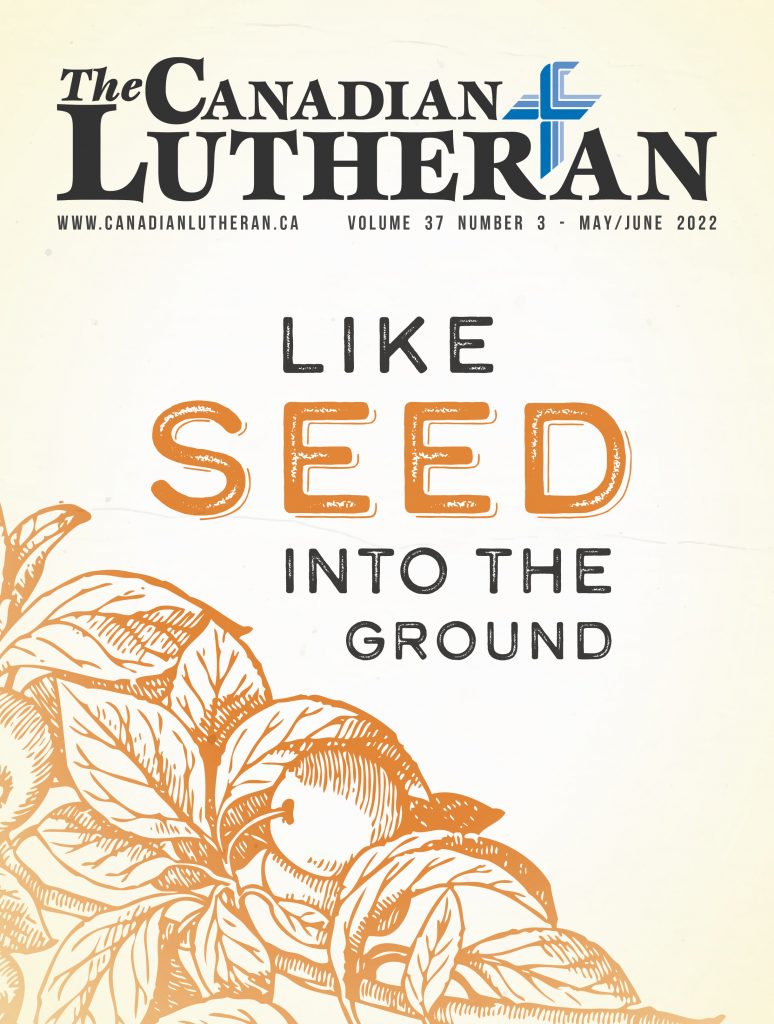Like Seed into the Ground
 by Mathew Block
by Mathew Block
Jesus told a parable: “A sower went out to sow…” And you know the rest. Some seed fell on the path and was eaten by birds. Some fell on rocky ground where it grew a little, before ultimately shriveling in the sun because of its shallow roots. Still more seed landed among weeds and was choked out. But some fell in good soil and there it brought forth a rich harvest.
The seed, as Jesus explains, is the Word of God. It is planted in the hearts of those who hear it, just as seed is planted in the ground. But there are different kinds of soil, different kinds of environments in which seed may either thrive or perish. So too with the faith which springs from hearing God’s Word. The devil can snatch it away before it has time to germinate. Trials and suffering can kill it off if its roots are shallow. It can languish and die if we neglect it in favour of other things. But, in those who hear the Word of God and treasure it, faith can flourish and bear fruit.
The parable is simple enough, but we can nevertheless be left with a question—not about what the passage means (Jesus has explained it) but rather what it means for us. What kind of soil am I? What kind of soil are you?
God indeed casts His Word into this world, seeking a harvest of faith—and we know that His Word will not return to Him empty; it fulfills the purpose for which He sends it (Isaiah 55:11).
Questions like this shouldn’t be our primary focus; the good news of the parable is that it is God who plants His seed in us! But it can also be healthy to reflect upon our response to God’s Word. Do we ignore it? Do we acknowledge it as true yet resist studying it more deeply? Do we spend our time on everything else rather than it? Or do we instead, as Martin Luther encourages us in the Small Catechism, seek to “hold it sacred and gladly hear and learn it?”
 If you have ever put in a garden, you know that there’s more involved than just popping seeds into the ground. The earth must be tilled. Weeds must be pulled. The soil might need amending to improve drainage. Fertilizer may be required to give plants the nutrients they need. Harmful insects need to be removed. Animal pests need to be deterred. There are many obstacles to remove so that seeds can do what they do best: grow.
If you have ever put in a garden, you know that there’s more involved than just popping seeds into the ground. The earth must be tilled. Weeds must be pulled. The soil might need amending to improve drainage. Fertilizer may be required to give plants the nutrients they need. Harmful insects need to be removed. Animal pests need to be deterred. There are many obstacles to remove so that seeds can do what they do best: grow.
I confess, I have not always been the best gardener of my soul. I have let the ground grow hard. I have failed to water as often as I ought. I have let the weeds grow rampant. And the seed suffers for it. But even so, God does not abandon us! No, “a bruised reed He will not break” (Isaiah 42:3; Matthew 12:20); He comes in mercy to nurse the sickly seed of faith back to health. He feeds us on His Word, the same Word through which He first planted faith in our hearts. He nurtures the seed and sends His Holy Spirit to make it grow—to make it fruitful (Galatians 5:22-23). For it is ultimately God, not us, who causes faith to grow (Mark 4:26-28). Good gardening is important; but it is God who gives the growth (1 Corinthians 3:6-7).
That growth only comes, as Rev. Dr. Richard Beinert writes this issue, when we are connected to Jesus, as a branch is to a vine . And Rev. Ted Giese reminds us that the life we receive from Christ is itself fruit born from a tree—or rather, the Tree—which He embraced on our behalf (page six). Thus nourished, the seed of faith planted in each of us blossoms in different ways, depending on our vocations—something Rev. Dr. James Gimbel explains. But we all have a role to play in the vineyard of the Lord. Friends share the Gospel with others, helping sow the Word of God in new soil. Parents nurture the seedlings of faith in their children. Pastors in particular play an important role in cultivating faith, and it is fitting therefore that we also celebrate the first calls of graduating pastors this issue. Finally, all of us, both church workers and laity, are called to pray for the fruitfulness of God’s Word in the mission field of this world (Matthew 9:37-38; Luke 10:2).
“Almighty God, Your Word is cast like seed into the ground” (LSB 577). So begins a popular hymn based on the parable of the sower. God indeed casts His Word into this world, seeking a harvest of faith—and we know that His Word will not return to Him empty; it fulfills the purpose for which He sends it (Isaiah 55:11). Amen, then, Lord Jesus. Grant Your seed abundant growth—both in the world at large as well as in our own hearts. “Let it yield a hundredfold the fruits of peace and joy.”
———————
Mathew Block is editor of The Canadian Lutheran and the Communications Manager of the International Lutheran Council (ILC).





